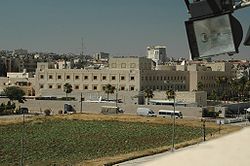| Embassy of the United States, Amman | |
|---|---|
 The embassy in 2006 | |
 | |
| Address | Al-Umawyeen Street, Amman |
| Coordinates | 31°56′44″N35°52′49″E / 31.945437°N 35.880187°E |
| Opened | July 4, 1992 [1] (current building) |
| Chargé d'affaires | Peter Shea |
| Website | jo |
The Embassy of the United States in Amman is the diplomatic mission of the United States to the Hashemite Kingdom of Jordan. It is located on Al-Umawyeen Street in Amman, the capital of Jordan. [2]
Contents
The current Chargé d’Affaires of the Embassy is Peter Shea, serving since June 2025. [3]